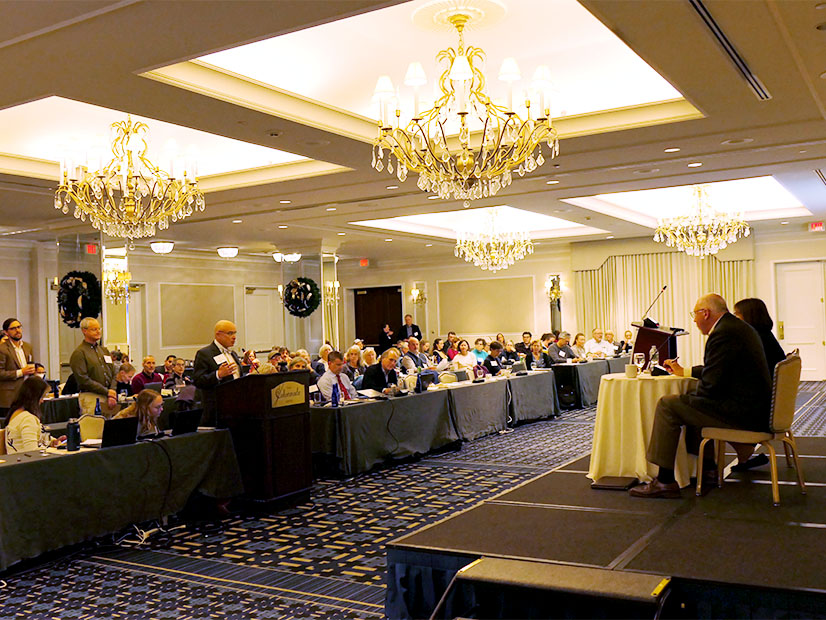BOSTON – Climate activists asked ISO-NE board members to make all board meetings open to the public and advocated for more transparency into NEPOOL proceedings at the quarterly Consumer Liaison Group (CLG) meeting Dec. 4.
“Listening to the people who foot the bill for the entire system seems like an important part of your responsibility,” said Mireille Bejjani, co-executive director of Slingshot, a local environmental justice organization. Bejjani thanked ISO-NE board chair Cheryl LaFleur and board member Michael Curran for attending the meeting but said more work is needed to increase the RTO’s accountability to the public.
The board members said the RTO has made progress on transparency, while acknowledging more work is needed.
Curran, who previously chaired the MISO board of directors, said the level of public interest and engagement with ISO-NE “doesn’t exist in any other area of the country.”
Public speakers at the meeting also said the RTO should take a more active role in decarbonization. Kannan Thiruvengadam, the director of an urban farm in East Boston, opened the meeting with a plea for climate action.
“It’s not just that we’re on the brink; we’re also moving in a precarious direction,” Thiruvengadam said. “I appeal to all of you to come together to meet the pace of the crisis by fixing your ways and honoring Mother Earth.”
ISO-NE representatives emphasized the limits of the RTO’s authority and its role as a fuel neutral organization. LaFleur and Curran both spoke favorably about carbon pricing but said the New England states have not coalesced around the topic.
“We strongly favor carbon pricing,” said LaFleur, calling it “the easy way to take an externality and price it in, by putting it in the price stack.”
“I think the ISO has made it clear that we think there would be a lot of benefits from carbon pricing,” said Curran. “As much as we can advocate, we can’t force.”
One speaker asked if ISO-NE’s emissions accounts for methane leaked from the gas network. Methane has intense near-term warming effects on the atmosphere, and studies have found state and federal estimates to significantly underestimate methane leaks from the natural gas supply chain.
“We have not captured the methane emissions … we’re focused on the generators on the system,” said Anne George, chief external affairs and communications officer for ISO-NE. Curran told the audience he would follow up on the question about methane emissions.
Keynote Speech from Commissioner Chang
FERC Commissioner Judy Chang also emphasized FERC’s role as a “fuel neutral” organization in her talk to the CLG. “We basically regulate the roads, the transfers across states,” Chang said.
Chang highlighted the need for forward-looking transmission planning and called Orders 1920 and 1920-A “a solid set of policies to encourage the country to think about planning for the longer term.” (See FERC Order 1920-A Wins Approval with Accommodations to States.)
“Hopefully by planning longer term, we can look into the future … and plan in a more cost-effective way,” Chang said.
The commissioner also said she is a “big advocate for demand response,” adding that demand flexibility is increasingly important with load growth on the horizon.
“I don’t think this is a technology barrier. I think this is more of a policy barrier,” Chang said, noting that retail customers largely are shielded from wholesale prices and have little incentive to respond to peak demand price spikes.
Responding to a question from New Hampshire Consumer Advocate Don Kreis about a potential gap in state and federal oversight on asset condition spending by transmission owners, Chang said there is an opportunity to increase transparency into how asset condition projects are planned. (See New England States Raise Alarm on Eversource Asset Condition Project.)
“To the extent that there is a gap between federal regulation and state regulation … I think we need to close the gap,” Chang said. “I know this region has a lot of interest in that.”




